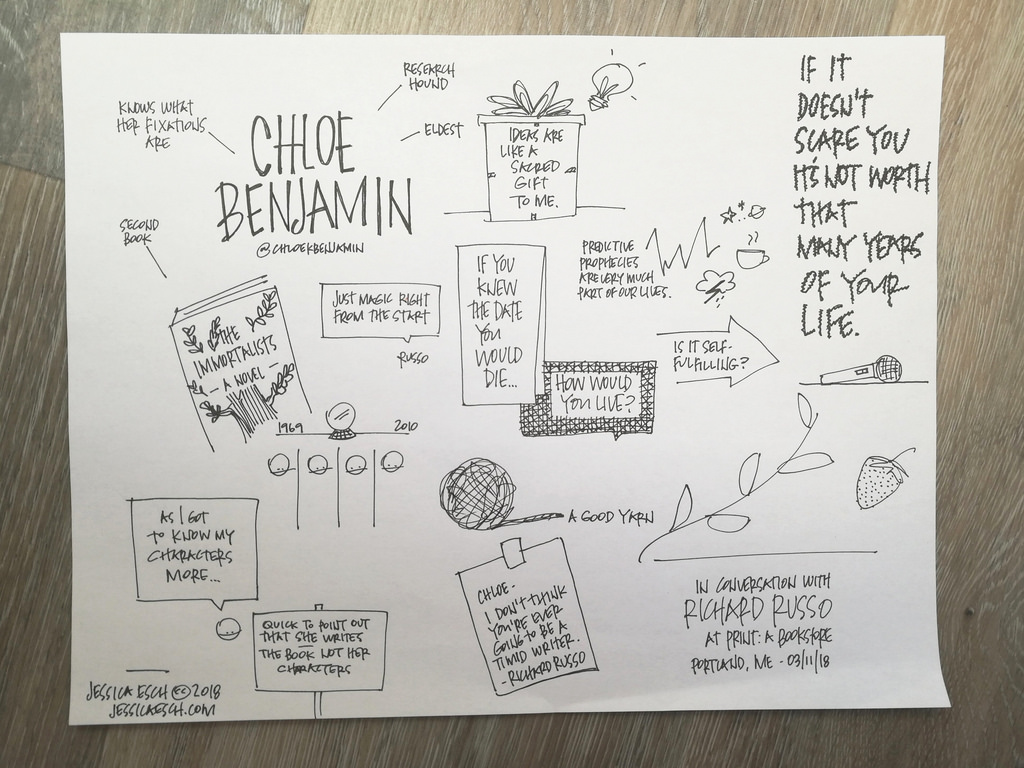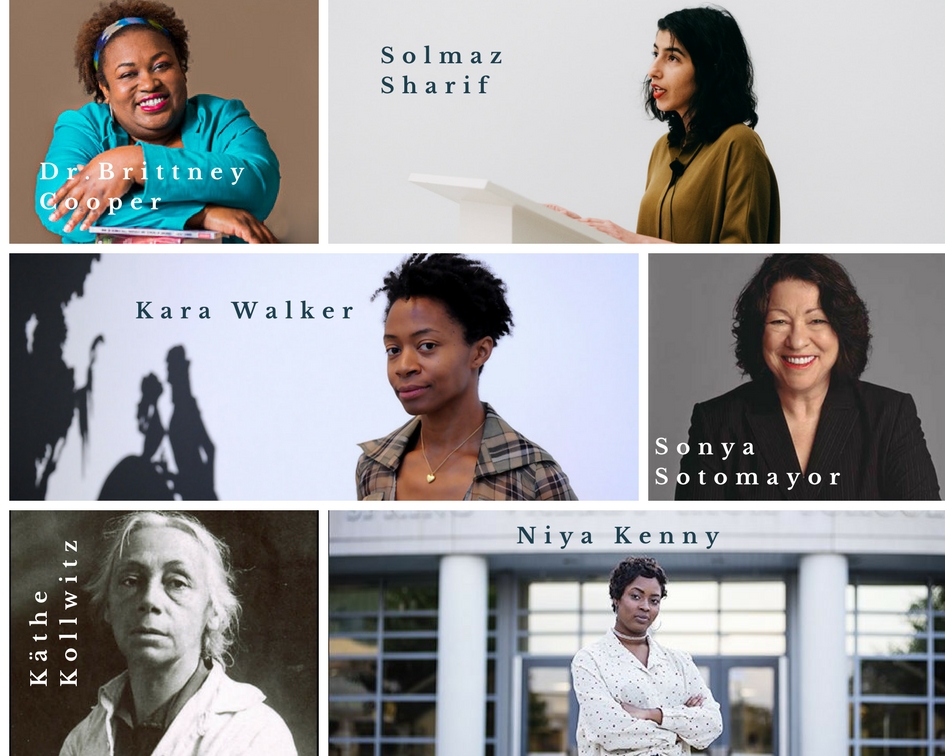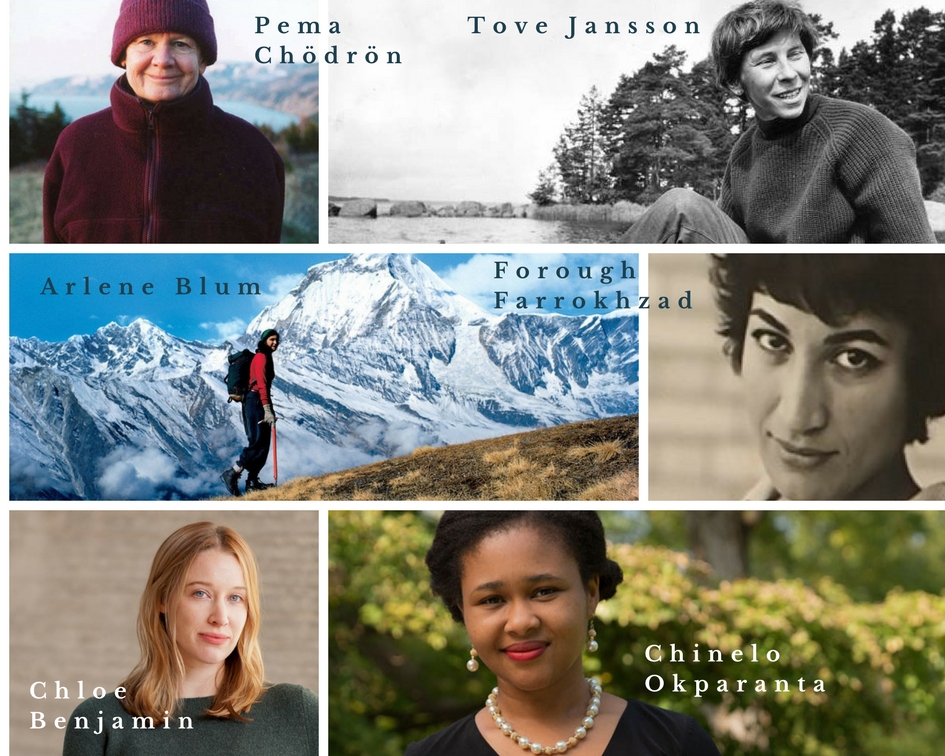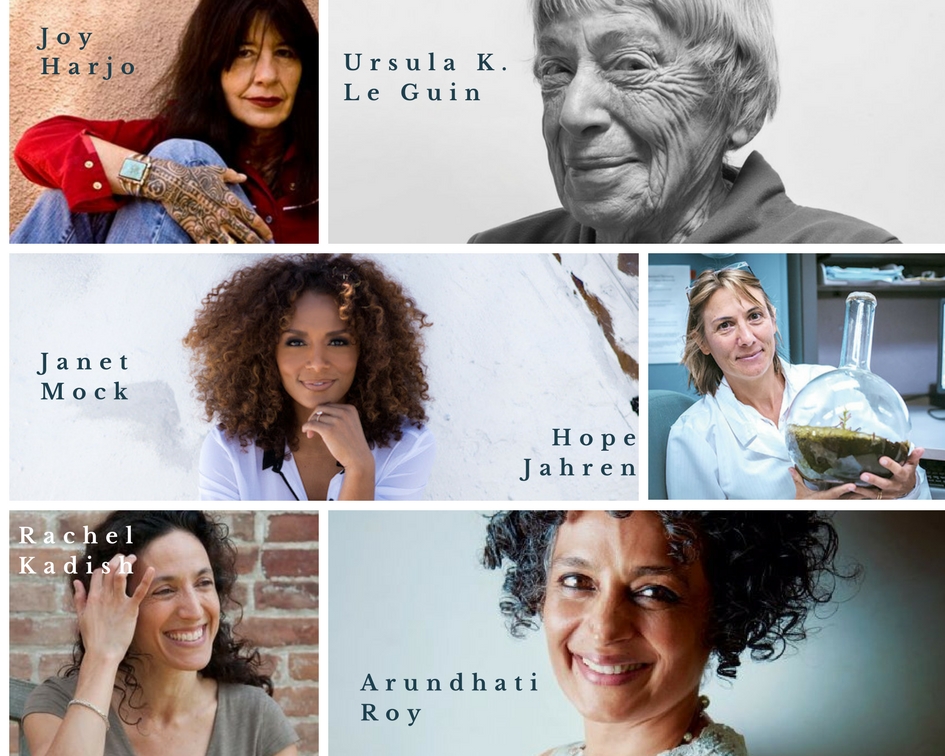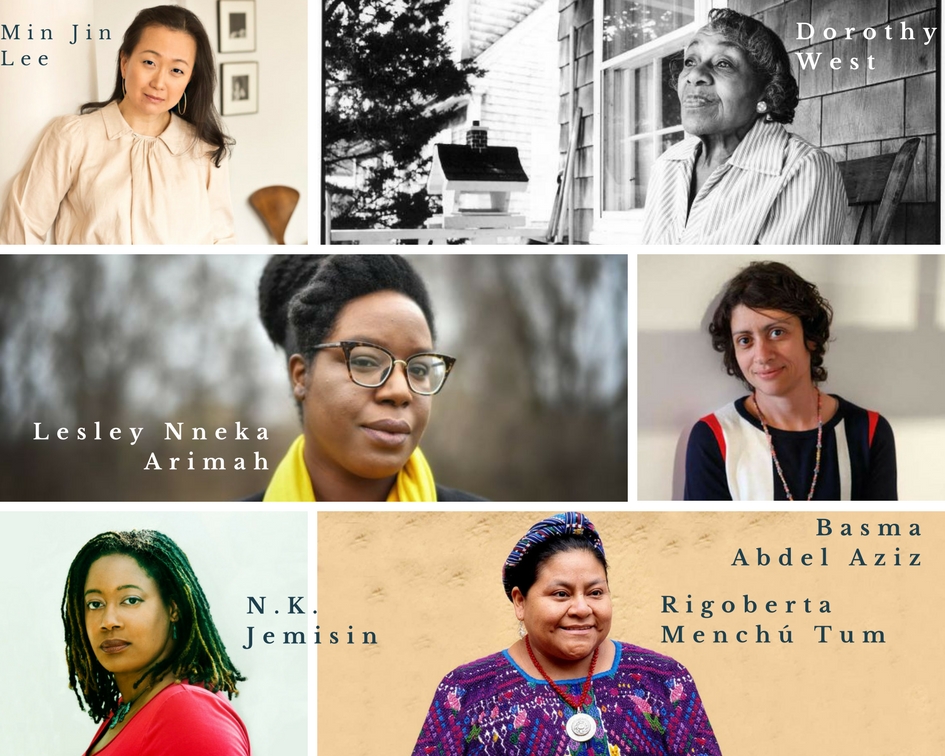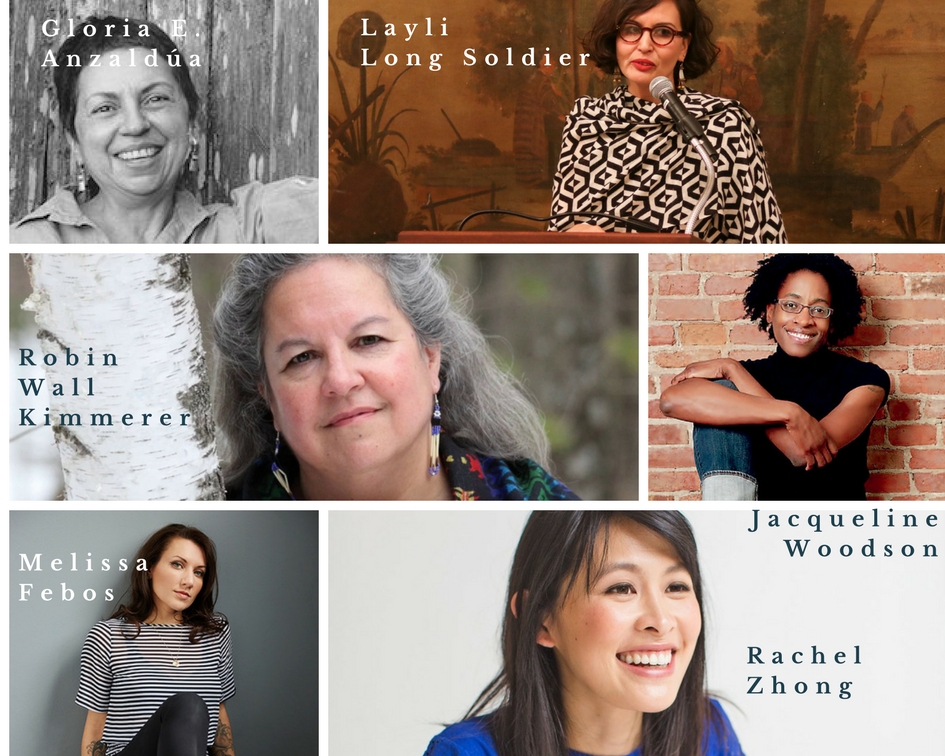Writers, Creators, History-Makers
April Staff Picks
You just can’t stop the inspiration of Women’s History Month: in April we continue celebrating women who have made history and who are making history (you can do this at the library all year long if you want!). In word and image, our April Staff Picks share just a few writers and journalists, mountaineers and musicians, makers, scientists, activists, artists, scholars, and other trailblazing historical and contemporary figures.
Youth Services
Carrie’s Pick
I Am Malala: How One Girl Stood Up for Education and Changed the World, by Malala Yousafzai
Malala was taught by her family to stand up for her beliefs and to be brave in the face of adversity; now Malala stands up for the rights of all girls to receive an education. For her peaceful activism, she is the youngest ever Nobel Peace Prize winner. The Young Readers Edition of her biography is not only an inspiring story for young people finding their own voices in the youth empowerment movement, but also for adults wondering how they can support and inspire the young people in their lives.
For more ideas, check out our Kids and Families booklist Smart Girls and Powerful Women.
_________________________________
Cindy’s Pick
I love the Laura Ingalls Wilder series as a whole. I think she chronicled her early life during a time that is endlessly fascinating. We revel in watching Laura and her sister Mary playing in the prairie grass or on the banks of Plum Creek as children, we bite our nails in fear for her family as they live agonizingly through The Long Winter, nearly starving to death. We watch her grow up, court a young man and ultimately get married and have children of her own. Her stories are so human and simple on the surface, but speak at a very deep, compelling level.
Adult Fiction
Elizabeth’s Picks
Aminatta Forna’s new novel Happiness beautifully explores the lives (and losses) of wolves and coyotes, foxes, parakeets and owls—as well as a group of thoughtful humans who engage and empathize with each other on the streets of London. Jean Turane, a wildlife biologist studying London foxes, is thrown together with Dr. Attila Asare, a gifted psychiatrist who works with war and trauma survivors. Jean helps as Attila searches London for his young nephew Tano, who has run away from a foster home after being placed there when immigration officials arrest his mother.
Forna’s fiction might especially appeal to fans of Barbara Kingsolver (Animals! Nature! People!) and Zadie Smith (People! Ideas! London!). Happiness wings on chance encounters and coincidence, but is also gently grounded in the steady, deliberate actions of attention, aid, and care that its cast of characters offer each other.
Another favorite recent read was Min Jin Lee’s epic novel Pachinko.
_________________________________
Brandie’s Pick
“The power of words. They weaseled under door crevices and through keyholes. They hooked into individuals and wormed through generations.”
I devoured The Immortalists and recently heard author Chloe Benjamin speak at Print: A Bookshop. The image below, inspired by the reading, was created by local writer and illustrator Jessica Esch. (I asked if I could use her image because it’s such a great snapshot of the story: click on it to see a larger version). The basic premise of the book is: if you were told the date of your death, how would it shape your life?
The Immortalists starts in 1969 in New York City. Word spreads that a fortune teller who claims to be able to tell anyone the day they will die is in the neighborhood, so the four young Gold children combine their allowances and sneak out to hear their fortunes. The prophecies they hear that day inform the next five decades for the siblings. Each chapter follows the life of one of the Gold children, spanning a timeline from the start of the AIDS epidemic in San Francisco, through the 80s, and into the early years of this century. Benjamin is a fantastic storyteller. She’s created a tremendously thought-provoking book—and it makes me wonder: would you like to know the date of your death? Hmm…
_________________________________
Music
Raminta’s Pick
Every Time I Feel the Spirit: The Concert Album, by Sister Rosetta Tharpe
Sister Rosetta Tharpe has been eligible since 1963 to be a member of the Rock and Roll Hall of Fame, but it wasn’t until this year that she was inducted into it as an Early Influence. Sister Rosetta is a pioneer in rock and blues. She came onto the recording scene in the 1938 with four hit songs, including Rock Me. Her 1945 single Strange Things Happening Every Day popularized gospel music and brought it into the mainstream. In 1947, she brought onto the stage a 14-year-old Little Richard Penniman. Little Richard is to have said that this changed his life and made him want to follow a path to music. Johnny Cash, Aretha Franklin, Eric Clapton, Tina Turner, and many other musicians have also cited her as influence and inspiration.
Sister Rosetta was rock before rock. She was the first to use heavy distortion in her electric guitar playing. Even her early works sound like mixes of blues and gospel. There are calls and responses mixed in with slick guitar solos. If you have no experience with Sister Rosetta Tharpe, I implore you to listen to this two-disc concert.
Adult Nonfiction
Aprill’s Pick
I am so excited to spend some time with novelist Julia Pierpont’s new non-fiction book, The Little Book of Feminist Saints.
Modeled after the traditional Catholic Saint of the Day books, The Little Book features “matron saints” complete with feast days, brief blurbs about their lives and work, and bold, lively portraits by Manjit Thapp.
From Sappho to Kara Walker to The Night Witches- I can’t wait to celebrate the history changers that Pierpont has canonized!
_________________________________
Nate’s Pick
The Grid: The Fraying Wires Between Americans and our Energy Future, by Gretchen Bakke
Professor Bakke was one of my first professors in college. She taught a class called The Anthropology of Religion, introducing me to the work of outsider artist Howard Fincher as well as the various ways humans bridge existential gaps regarding what our lives mean and what happens when we die. More recently Professor Bakke has written a book detailing the intricacies of the U.S. electrical grid. I am finding this subject fascinating and the book has shed light on an essential part of my life that I know almost nothing about. This work examines the initial, haphazard way in which electricity use and grids were developed here, and goes on to address some of the current problems associated with our countries’ aging infrastructure and current attempts in integrate renewable sources of energy into sections of the grid. Written with non-electrical engineers in mind, Professor Bakke has crafted a compelling story which engages an easily ignored but vital component to our current standards of living.
_________________________________
Jim’s Pick
Käthe Kollwitz (1867-1945) was my first major inspiration in learning how to make an art heartfelt and political. An Expressionist artist during the 20th century’s worst horrors, Kollwitz lost her youngest son to WWI and a grandson to WWII. She barely escaped deportation to Nazi concentration camps but her international fame at that time saved her; she died sixteen days before the war ended. Through it all she remained active in antiwar groups and activist organizations and always, always continued to make her art.
Eileen’s Pick
Let’s face it, flawed is the only kind of person there is.
Allow me to suggest reading absolutely anything by Pema Chödrön, an American-born octogenarian Tibetan Buddhist nun who allows that being a flawed person not only is acceptable, but the best thing imaginable.
Opportunities abound to acknowledge our flaws and those of others, so there is no time wasted with finger-drumming, waiting for your order of necessary equipment. We can all get right to work. Pema guides us in awareness, acceptance and working with ourselves and others just as we are. She is spunky, a conduit for ancient wisdom in a modern world, someone you’ll want to spend time with.
I select as my personal favorite Pema Chödrön book, based on the micro-sized attention span needed to read it: Comfortable With Uncertainty : 108 Teachings on Cultivating Fearlessness and Compassion.
Other titles recommend themselves:
Start where you are : a guide to compassionate living
The places that scare you : a guide to fearlessness in difficult times
When things fall apart : heart advice for difficult times
That’s just a sample. Cruise PPL’s catalog, slip into MaineCat. Pick a title, any title.
Pema will help you find the wisdom in ordinariness and the joy in being painfully human.
Elizabeth’s Picks
Dr. Brittney Cooper’s Eloquent Rage: A Black Feminist Discovers Her Superpower and journalist Masha Gessen’s The Future is History: How Totalitarianism Reclaimed Russia are two recent additions to the nonfiction collection. Gessen won the 2017 National Book Award for Nonfiction for The Future is History: the personal is deeply political as her fascinating storytelling follows the lives of contemporary Russians impacted by the state.
Dr. Cooper’s Eloquent Rage is centered in Black Feminism—capital B, capital F, as she notes: “That means I learned my feminism from Black women, and my feminist theory and praxis is situated in the particular ways Black women have understood, thought about, and written about the problems of racism and sexism across space and time.”
She continues: “My feminism begins not with Susan B. Anthony and Elizabeth Cady Stanton showing out at Seneca Falls, but with Maria Stewart, a Black lady abolitionist, who was schooling audiences of men and women, Black and white, in Boston in the 1830s. When Sister Stewart asked her audience, ‘How long shall the fair daughters of Africa be compelled to bury their minds and talents beneath a load of iron pots and kettles?’ I see in her question an insistence on prioritizing the well-being of Black women and girls…Stewart concludes her speech by telling Black women, ‘Do you ask the disposition I would have you possess?…Sue for your rights and privileges. Know the reason you cannot attain them. Weary them with your importunities. You can but die if you make the attempt; and we shall certainly die if you do not.’ ”
From what Black Feminism has taught the author—ranging through the inspiration of Maria Stewart as well as Dr. Cooper’s mother and grandmother, the women of the Combahee River Collective, Beyoncé, deep friendships and critical homegirl interventions—Eloquent Rage goes on, exploring subjects rooted in Dr. Cooper’s love, attention, and concern for the lives and creative universes of Black women and girls. As she writes: “What do Black women and girls need? What does it look like to create a world in which Black women and girls can thrive?”
Meg’s Pick
I recently devoured Arlene Blum’s Annapurna: A Woman’s Place, which chronicles the 1978 ascent of Annapurna I by the American Women’s Himalayan Expedition. Annapurna is the 10th highest mountain in the world at 26,545 feet and the first 8,000-meter peak to be climbed by Maurice Herzog‘s French expedition team in 1950. Known for its icy slopes and avalanches, Annapurna has the highest fatality rate in the world at 34%. Prior to 1978, there had four successful accents of out the 13 attempts and Annapurna claimed the lives of nine climbers (Blume, pg. 8). Ten American mountaineers faced a daunting task, and incredible skepticism, as they prepared for their expedition.
Before delving into the details of the expedition, Blum’s introduction serves as a short history of women mountaineers from 1805 to the 1970s, including Marie Paradis, the first woman to climb Mont Blanc; Alexandra David-Neel, the explorer and writer who visited Tibet in 1924; New England rivals Fanny Bullock Workman and Annie S. Peck; and French designer and alpinist, Claude Kogan. This was the first time I’d read many of the names mentioned in the introduction and I was shocked to find myself so uninformed on the history of female mountaineer heroines. Blum had me diving into the book’s bibliography before Chapter 1!
As the book went on, I was engrossed in the details of the trip. The personalities of the women, the fundraising, the planning and packing, issues with customs, sherpas, and porters, personal doubts, weather, gear, and terminology. I continue to be struck by a Blum’s response to the debates about the psychological and physiological differences of men and women in climbing: “I don’t believe that such comparisons are of any value. Individual differences are more important than sexual ones, and motivation counts most of all. Women do have the strength and endurance to climb the highest mountains, just as men do, and both men and women should have the chance.”
I think I’m ready to give crampons and ice climbing a go next season.
Hazel’s Picks
“We all craft a story we can live with. The one that makes ourselves easier to live with. This is not the one worth writing. To write your story, you must face a truer version of it. You must look at the parts that hurt, that do not flatter or comfort you. That do not spare you the trouble of knowing what made you, and what into.” -Melissa Febos
Too Much and Not the Mood by Durga Chew-Bose and Abandon Me by Melissa Febos
Sometimes the most triumphant and vulnerable thing a woman can do is tell her story exactly as she wants it told. These two essay collections have both left me reeling in recent months for their honesty, wit, insight, and utter lack of apology. Chew-Bose and Febos are both sure even as they waver, solid even in their most tender moments. These are very different books written by very different women, but both authors explore timeless literary and existential themes of identity, language, and memory in ways so bright and refreshing, I swear that when I finished each one, I could sense myself coming to, coughing up water, breathing.
_________________________________
Thanks for reading! And if you’re still looking for more literary inspiration, join poet Crystal Williams for a reading at 3 p.m. in the Main Library this Saturday April 7th.
posted: , by Elizabethtags: Library Collections | Recommended Reads | Adults | Readers Writers




